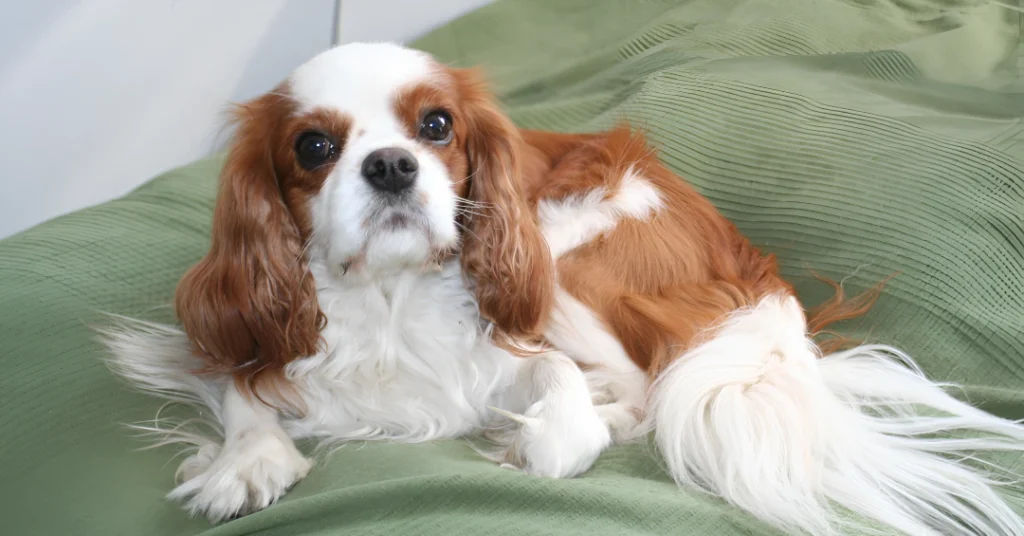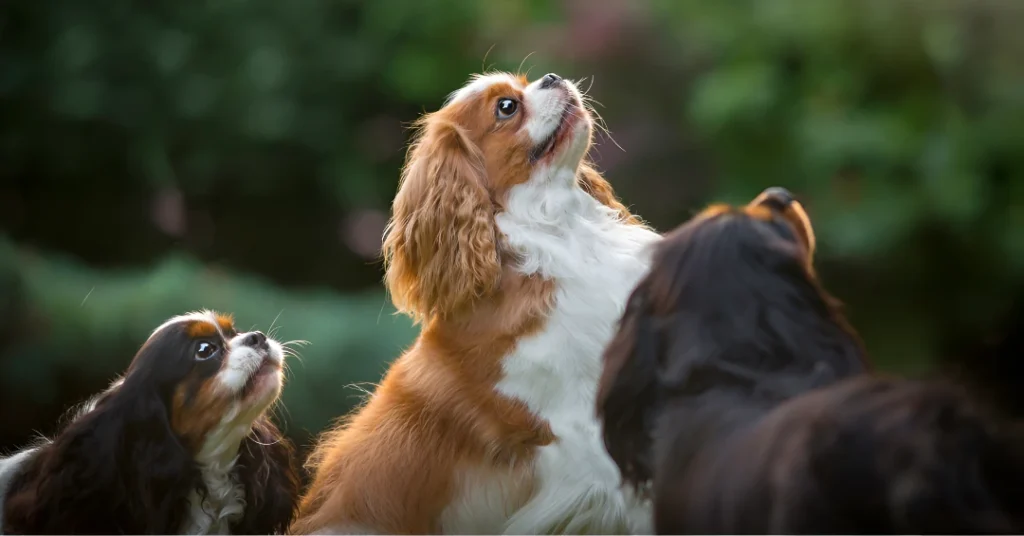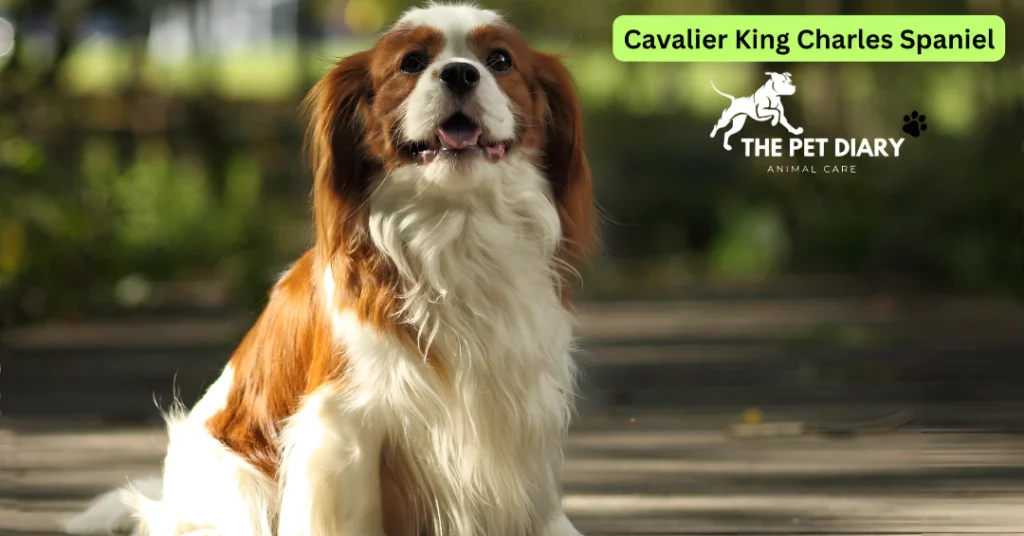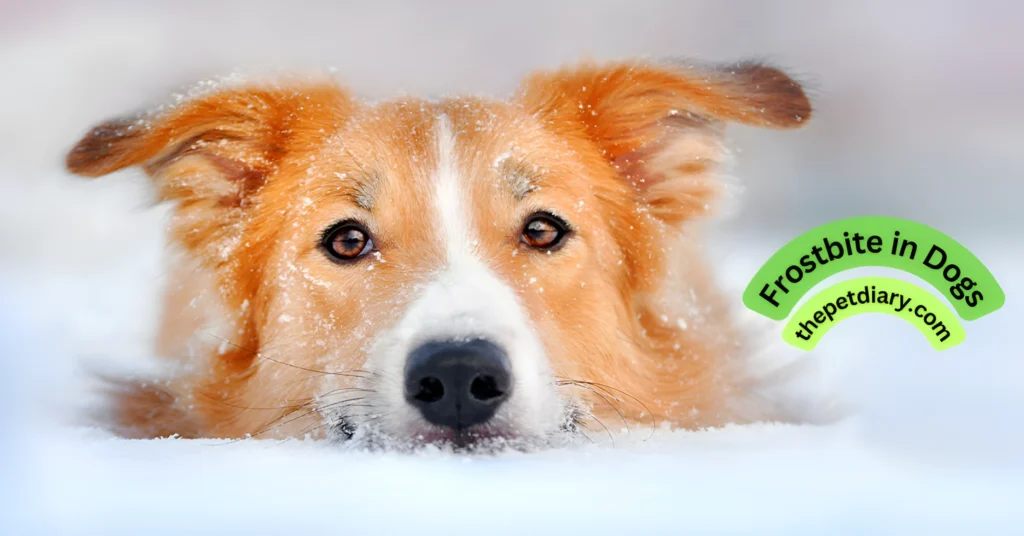The Cavalier King Charles Spaniel, one of the most popular toy breeds, is valued for its kind disposition and charming looks. These dogs, who are well-known for their smooth coats and lively eyes, are excellent companions for elders, families, and single people. Cavaliers are kind, playful, and incredibly flexible in both apartments and larger homes, despite their royal ancestry. They love cuddling as much as playing outside and thrive on human interaction. These spaniels can have long, healthy, and contented lives if given the right care, training, and attention. If you want a loyal, considerate, and elegant dog, the Cavalier King Charles Spaniel may be the best option, as highlighted in the Cavalier Spaniel breed info.
Caring:
Cavalier King Charles Spaniels are little dogs that typically stand 12 to 13 inches in height and weigh 13 to 18 pounds. They are small, have a long back, a deep chest, and floppy ears by nature. Cavaliers’ long, silky coats are available in four different hues with unique patterns:
- Blenheim Cavalier King Charles Spaniels possess white and reddish-brown fur, a white body with red patches, red ears, and a partly red mask.
- Tricolor Cavalier King Charles Spaniels are black and white with tan points.
- Ruby Cavalier King Charles Spaniels are solid red dogs.
- Black and tan Cavalier King Charles Spaniels have black fur with tan markings.
Brushing is required once a week to help minimize shedding and preserve their long coat. Additionally, they need regular professional grooming, so budget appropriately.
The Cavalier King Charles Spaniel dog breed, which was once created as a friend, now likes to sit in your lap or remain by your side. However, these placid dogs are content to relax on the couch with their family after their energy requirements are satisfied.
Health Issues:

Cavalier King Charles Spaniels often live 12 to 15 years. They need regular physical examinations, though, because they are susceptible to a number of illnesses.
Although ethical breeders typically check dogs for health problems before breeding, it might be wise to get pet insurance when you bring home a Cavalier King Charles Spaniel puppy.
Eye Disorders
Cavalier King Charles Spaniels frequently suffer from eye conditions like cataracts, dry eye, cherry eye, and retinal problems.
An eye exam, which is noninvasive, painless, affordable, and simple to perform on the dogs during a routine veterinarian visit, can identify these. Your veterinarian examines the retina, or back of the eye, and the surface of the eye for anomalies using specialized equipment. They also test your dog’s tear production.
The following are typical signs of eye issues in Cavalier King Charles Spaniels:
- Swelling in the corner of the eye
- Eye discharge
- Squinting
- Cloudy eyes
- Bumping into things
Surgery or long-term eye medication may be required, depending on the eye condition that is diagnosed.
Patellar Luxation
The Cavalier King Charles Spaniel dog breed is prone to patellar luxation, sometimes known as slipping kneecaps. Although your dog may be diagnosed with this illness at any point, including before they exhibit any symptoms, it is typically discovered during the first 18 months of life.
Patellar luxation typically affects both hind legs and results in limping, lameness, and “bunny hopping.” Depending on the severity, treatment typically consists of anti-inflammatory drugs, exercise restriction, and, in extreme situations, surgery.
Hip Dysplasia
Cavaliers and King Charles Spaniels are also frequently affected by hip dysplasia. When the thigh bone does not properly fit into the hip bone, this disease develops. Either a hereditary illness or environmental factors like obesity might be to blame for this.
Dogs with hip dysplasia frequently exhibit systemic symptoms like lethargy and anorexia in addition to pain symptoms like limping and lameness.
Any dog’s hips should be inspected by a veterinarian prior to breeding. X-rays are taken on Cavalier King Charles Spaniel puppies as early as four months to stop breeders from passing on this hereditary disorder.
Mitral Valve Cavalier King Charles Heart Disease
Cavalier King Charles Spaniel deaths are caused by the heart’s malfunctioning mitral valve, which typically maintains blood flow in the right direction.
Blood can flow backward when the mitral valve is malfunctioning, which exacerbates the damage to other heart muscle components. Congestive heart failure is nearly always the result of MVD in Cavalier King Charles Spaniels, in contrast to other dog breeds.
Signs of MVD include:
- Coughing
- Exercise intolerance
- Difficulty breathing
- Fainting episodes
Syringomyelia
The severe, inherited, progressive neurological condition known as syringomyelia (SM), also known as “neck scratcher’s disease,” is typically identified in Cavalier King Charles Spaniels between the ages of six months and three years, though cases have been documented in dogs as old as ten.
This disorder, which frequently results from anomalies of the brain and skull, causes fluid to accumulate around the spinal canal. An MRI scan or the observation of the traditional clinical symptoms listed below are used to make the diagnosis.
SM symptoms include:
- When aroused or on a leash, scratching on or in the air close to the shoulder.
- Whimpering, wailing, or yelling in agony without any obvious cause.
- Weakness in the legs.
- Head shaking.
- Lip licking.
- Seizures.
While medical management is helpful, not all clinical signs will be resolved. For dogs who exhibit severe disease symptoms, surgery is the only way to help reduce pain.
How Much Should You Feed a Cavalier King Charles Spaniel?
For mature dogs, two meals per day are advised. Your dog’s weight, health, and lifestyle all affect how much food they should be provided. To ascertain nutritional requirements, see your veterinarian, according to the directions on the packaging, or get in touch with the dog food producer (because veterinary nutritionists are employed by AAFCO-compliant diets).
Nutritional Tips for Cavalier King Charles Spaniels
Generally speaking, a dog receiving a well-balanced, AAFCO-compliant diet is receiving all the vitamins and minerals required for growth and development. Methylsulfonylmethane (MSM), chondroitin, and glucosamine are excellent supplements for healthy joints. MSM has anti-inflammatory, natural qualities. According to research, lowering inflammation aids in managing osteoarthritis pain, which is a common condition affecting dogs’ joints.
When taken in the right amounts, essential fatty acids like omega-3 (good fish oil) may have anti-inflammatory effects. Additionally, they are known to promote heart and eye health.
Additionally, probiotics are used to strengthen immunity and digestive health. Probiotics may not be necessary for a dog in good health, but they can help reestablish the body’s equilibrium when the dog is ill, stressed, or malnourished.
Behavior and King Charles Spaniel Training Tips

Cavalier King Charles Spaniel Personality and Temperament:
The temperament of the Cavalier King Charles Spaniel is amiable and devoted. They are known to be patient, tolerant, and get along well with young children and other pets, making them excellent family companions.
Despite being bred to be lap dogs, Cavaliers are members of the sporting family and like outdoor activities and moderate exercise. Both active, athletic families and more laid-back, homebody types who still put their dog’s health first through regular playtime and walks can benefit from them.
Cavalier King Charles Spaniel Behavior
It is not advisable to leave Cavalier King Charles Spaniels alone for long periods of time since they need company and human connection to thrive. They can thrive in a variety of living conditions, are incredibly amiable, and get along well with both family and strangers.
However, letting your Cavalier run loose is not a smart idea. A new scent may catch their attention and make them want to chase after it, which could lead to your dog getting hurt or lost. A Cavalier King Charles Spaniel should have a fenced yard.
Cavaliers are easy to train and willing to please. acclimating them to their surroundings. For puppies to develop into adults who are self-assured and at ease in novel circumstances, proper socialization is crucial. Constantly use positive reinforcement-based training.
Fun Activities for Cavalier King Charles Spaniels
- Obedience classes
- Agility
- Flyball
- Rally
- Hiking
- Neighborhood walks
- Backyard playtime
Cavalier King Charles Spaniel Grooming Guide
Regular brushing with a bristle or pin brush will keep the coat shiny and prevent tangles, making cavaliers easy to maintain. The length of time you keep your dog’s coat determines how frequently you should groom them; the longer the coat, the more frequent the grooming.
Skin Care
Bathing Cavalier King Charles Spaniels once or twice a month can help keep their skin free of irritants and their coat healthy. The best dog shampoo for maintaining healthy skin and a shiny coat is one that is gentle, soap-free, and contains oatmeal or aloe.
Maintaining a Coat
Regular brushing is necessary for the long, silky coats of Cavalier King Charles Spaniels. In addition to avoiding matting and tangles, brushing also serves as a massage and strengthens the bond between humans and animals.
Even though cavaliers don’t shed much, regular brushing will help minimize the amount of shedding that happens.
🐾Conclusion:
1-Is a Cavalier King Charles Spaniel a good family dog?
Yes, Cavalier King Charles Spaniels are known to be great family dogs. They are known to be tolerant and patient, which allows them to get along well with children, cats, and other dogs.
2-Are Cavalier King Charles Spaniels smart dogs?
Yes, Cavalier King Charles Spaniels are known to be bright dogs that are eager to please their humans, often making them easy to train.
3-How much does a Cavalier King Charles Spaniel cost?
The average Cavalier King Charles Spaniel price varies and depends on many factors. But in general, you can expect to pay $1,000–$2,500 for a Cavalier King Charles spaniel puppies cost. You might also find Cavalier King Charles Spaniels for adoption at breed-specific rescues.
4-Do Cavalier King Charles Spaniels shed?
Yes, Cavalier King Charles Spaniels shed a bit year-round, but they aren’t known to be heavy shedders.
5-Should I buy a teacup Cavalier King Charles Spaniel?
No. Teacup dogs are bred to be as small as possible, often without prioritizing the dogs’ health. Be wary of a Cavalier King Charles Spaniel breeder who is advertising teacup puppies.


